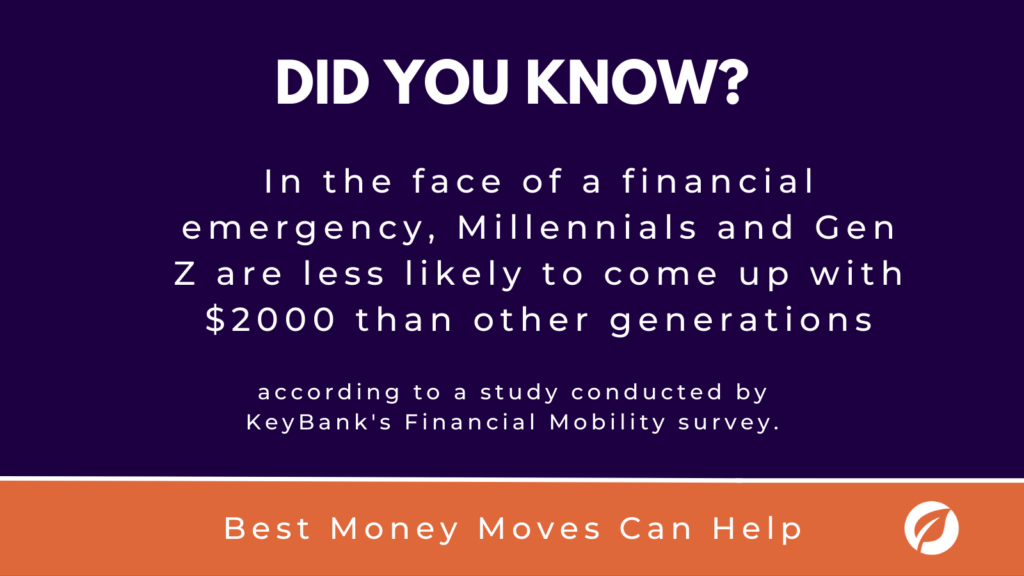Money habits vary across the generations in your workforce. After all, the financial needs of a Gen Z employee are going to be different than those of Baby Boomer. However, financial stress affects all Americans, regardless of their age, income or how they choose to spend their money.
Learn more about how financial stress can vary across generations — plus what you can do to dial down your employees’ financial worries.
3 Ways Financial Stress Impacts Various Generations
- Millennials and Gen Z are less likely to afford a $2000 emergency.
When it comes to saving for a rainy day, older generations fare better than their younger counterparts. In the face of a financial emergency, Millennials and Gen Z are less likely to come up with $2000, according to KeyBank’s Financial Mobility survey. A quarter of Gen Zers said they certainly cannot come up with $2000 in a pinch, whereas most individuals over 50 are confident they can afford a $2000 emergency.
- Baby Boomers’ top financial priority is preparing for retirement.
For most generational cohorts, affording everyday bills is their top financial priority. However, for Baby Boomers, their number one financial priority is preparing for retirement, according to a Society of Actuaries study.
A potential reason why retirement readiness is more of a concern for Baby Boomers, compared to other generations, is because they are the generation closest to retirement age. While younger generations have decades, Baby Boomers have a limited number of years to prepare for retirement.
Nearly 1 in 5 employees over the age of 59 do not have a retirement account, per a Credit Karma poll, the highest percentage for any generation. With retirement near on the horizon, this leaves less opportunity for older generations to save for the later years.
- Employees under 35 are more likely to ignore their finances when facing financial stress.
For many Americans, their worries and stress around money have only exacerbated in the past few years. However, when it comes to coping with financial stress, different generations tend to use different tactics.
About 4 in 10 employees of all ages spend less and budget more to cope with financial stress, according to a KeyBank survey. However, for employees under the age of 35, almost 1 in 5 cite ignoring their bank and investment accounts to cope with financial stress.
By ignoring their finances, employees are at risk for burnout and compounded financial problems. Overtime, this can worsen employees’ financial wellness, productivity and overall wellbeing.
3 Ways Financial Stress Impacts Various Generations
- Find engaging ways to educate employees across different generations on how to build a rainy day fund. For instance, to target Millennials and Gen Z, consider offering digital financial wellness tools and resources, instead of relying on literature and seminars. Younger generations prefer to manage their money and banking digitally, according to Bank of America’s Workplace Benefits report, so they may be more receptive to receiving financial wellness tools and support digitally.
- Offer employees an objective financial wellness provider and source. For many employees, a common source for retirement and financial advice for employees is their retirement plan provider. However, a PwC study found that employees across all generations want an objective financial wellness advisor or program not tied to their retirement plan provider. Think about which vendors are providing financial wellness benefits and consider where you may be able to add choice and variety of vendors.
- Invest in 1:1 financial advising and money coaching. Managing financial stress is difficult, especially when managing it alone. However, by investing in financial advisors, employers can provide a trusted guide to help employees navigate their most personal financial problems and stressors. Rather than relying solely on online resources, like budgeting tools, financial advisors provide employees with live, human support — this personalized touch can make it easier for employees to discuss sensitive financial matters.
Need a financial wellness program suitable for all generations? Try Best Money Moves!
Best Money Moves is a mobile-first financial wellness solution designed to help dial down employees’ most top-of-mind financial stresses. As an easy-to-use financial well-being solution, Best Money Moves offers comprehensive support toward any money-related goal. With 1:1 money coaching, budgeting tools and other resources, our AI platform is designed to help improve employee financial wellbeing. Our intuitive, easy-to-use program platform is fit for employees of any age and level of financial literacy.
Whether it be retirement planning or securing a mortgage, Best Money Moves can guide employees through the most difficult financial times and topics. We have robust benefits options for employers, regardless of their benefits budget.
Our dedicated resources, partner offerings and 700+ article library make Best Money Moves a leading benefit in bettering employee financial wellness.
To learn more about Best Money Moves Financial Wellness Platform, let’s schedule a call. Contact us and we’ll reach out to you soon.


